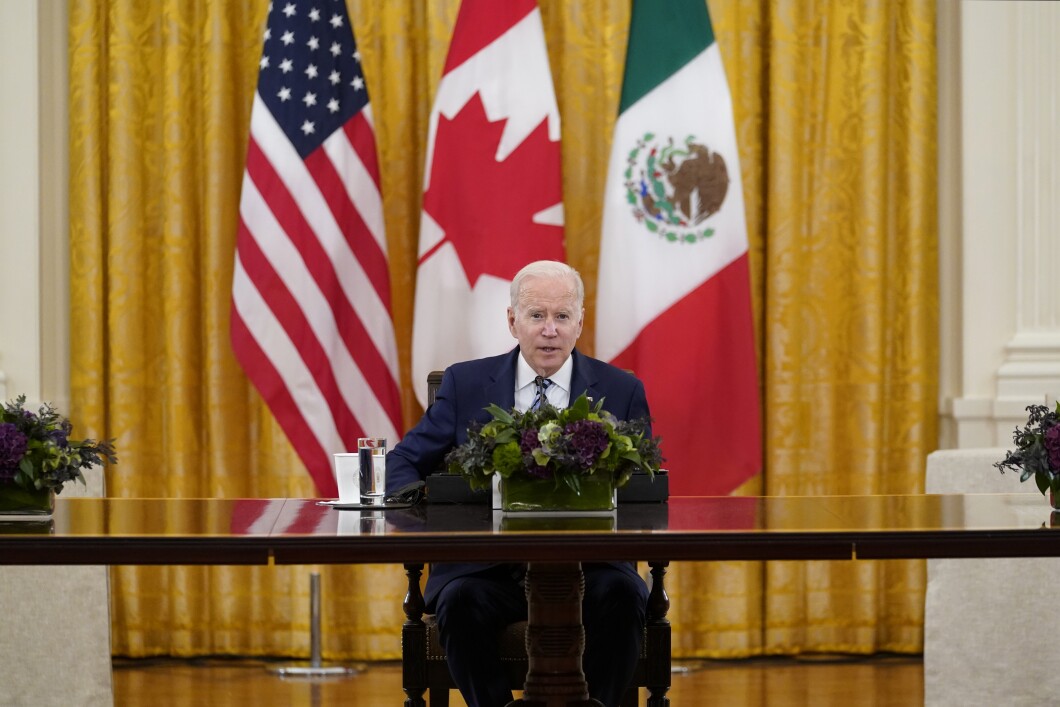
President Joe Biden is meeting with his North American counterparts for the second time of his administration, this time for two days in Mexico City.
The so-called “three amigos” summit will be overshadowed by Biden’s first trip to the border as commander in chief amid a surge in illegal migrant crossings and after last week’s new immigration policy announcement. But he, Mexican President Andres Manuel Lopez Obrador, and Canadian Prime Minister Justin Trudeau are poised to discuss an array of difficult issues, even if they publicly present a united front.
BIDEN TO ACKNOWLEDGE JAN. 6 ANNIVERSARY IN SHADOW OF HOUSE SPEAKERSHIP FIGHT
Here are four agenda items for the 10th North American Leaders’ Summit and its breakout bilateral conversations, scheduled to take place from Jan. 9-10:
Responding to the migrant surge after Biden’s border trip and immigration policy announcement
Climate change, drug trafficking, and “irregular” immigration will dominate the North American Leaders’ Summit, according to White House National Security Council spokesman John Kirby. U.S. “economic security, prosperity, democratic stability and, of course, migration management” depends on strong relationships with Canada and Mexico, the retired U.S. Navy rear admiral added during Friday’s press briefing.
But with U.S. Customs and Border Protection reporting a record-breaking almost 2.4 million border encounters last year, immigration is tipped to be Biden’s top concern. Biden’s urgency regarding immigration was underscored by last week’s announcement that he planned to introduce a parole program similar to the existing mechanism for Venezuelan nationals, which would expand legal pathways for 30,000 Cuban, Haitian, and Nicaraguan immigrants a month, in tandem with a rule that would disqualify asylum-seekers who apply at the border without first trying other options.
The summit’s immigration talks will be framed by the Los Angeles Declaration, rolled out at the Summit of the Americas last year with a focus on root causes, and will unfold as each of the three countries’ economies experience labor shortages.
Jason Marczak, senior director of the Atlantic Council’s Adrienne Arsht Latin America Center, praised Biden’s trip to El Paso, Texas, Sunday as “an incredibly sound decision” after Vice President Kamala Harris was criticized for traveling to Central America in 2021 without visiting the border.
“This is very important that President Biden is going to the border to see firsthand some of the challenges before he goes to Mexico City to talk about [it],” he told the Washington Examiner.
Cracking down on fentanyl drug trafficking as a national security issue
The flow of fentanyl into the U.S. from Mexico has “skyrocketed” in recent years, “wreaking havoc on American cities,” according to Marczak. More than 100,000 Americans died from fentanyl-related overdoses in 2021,with the Drug Enforcement Administration disclosing that it seized enough illicit, fentanyl-laced pills last year to kill every single American.
“A priority of President Biden is addressing how to further work from an intelligence, from a law enforcement perspective with our Mexican counterparts in disrupting fentanyl flows,” Marczak said. “Just this week with the arrest of El Chapo‘s son and the subsequent violence that’s ensued, I think that’s a gesture from the Mexicans to show that they’re serious about attacking drug trafficking before the president’s arrival.”
Center for Strategic and International Studies Americas Program director Ryan Berg agreed the Mexican Army’s capture of Ovidio Guzman, one of El Chapo’s sons and a Sinaloa Cartel leader, is “significant” after they were forced to release him in 2019 following being “outgunned” by the international organized crime syndicate.
“On the topic of security, the U.S. and Mexico need to continue implementing the Bicentennial Framework, the successor agreement to the Merida Initiative, which institutionalized security cooperation since 2007,” Berg wrote in a note. “With Republicans taking over the House of Representatives and set to launch investigations into deadly fentanyl trafficking from Mexico, the Biden administration likely feels pressure to show some progress in security cooperation.”

Mexico, in turn, is set to request assistance in stemming the flow of firearms across its border from the U.S.
The White House has downplayed any connection between Guzman’s arrest and the summit, but Kirby cited an increase in information-sharing between the U.S., Canada, and Mexico with respect to precursor chemicals, complimented by public health services, during Friday’s briefing.
Resolving trade disputes wrought by the U.S.-Mexico-Canada Trade Agreement
The U.S. traded more than a combined $3 million worth of goods with Canada and Mexico every minute during the first three financial quarters of 2022. But the economic integration has not prevented 17 disputes arising from the U.S.-Mexico-Canada Trade Agreement since it replaced the North America Free Trade Agreement in 2020.
“Several of them involve key pieces of Lopez Obrador’s domestic agenda, such as a domestic energy reform that favors the state-run utility company over the private sector, which had been free to invest in Mexico since a landmark energy reform in 2013,” Berg wrote in his note. “Another trade tension is more recent — the Mexican president’s move to ban [genetically modified] corn, which obviously has a large constituency in the U.S.”
In addition to the U.S. and Canada’s disagreements with Mexico, there is also a Canadian-Mexican complaint against the U.S.’s auto industry rules of origin interpretation.
But Berg pointed to trade opportunities for the neighbors as well as the U.S. looks to decouple its economy from China‘s by “nearshoring” or “friendshoring” supply chains through the Inflation Reduction Act and CHIPS and Science Act.
Aside from the trade “irritants,” Marczak mentioned climate change as another “sticking point.” Lopez Obrador, for instance, has “a greater affinity for investing his resources into new fossil fuels” than the U.S. or Mexico, according to Marczak. At the same time, water is an example of an important natural resource to the trilateral relationship.
“There’s still a lot of space, a lot of room to be reconciled between the U.S. and Mexico and the future of energy,” Marczak said.
Kirby amplified collaborative steps in reducing waste sector methane emissions and decarbonizing public transportation last Friday.
Easing tensions after Lopez Obrador snubbed Biden’s Summit of the Americas last year in Los Angeles
Lopez Obrador embarrassed Biden last June by boycotting the ninth Summit of the Americas, the first to be hosted by the U.S. He contended Biden should have invited the presidents of Cuba, Nicaragua, and Panama, but Biden declined to do so, describing them as autocrats.
“We’ve moved forward from those issues,” Marczak said. “The relationship with Mexico is too important to let not showing up in Los Angeles derail the relationship. … The relationship with Mexico is unlike any other foreign policy relationship because it’s not just a federal government to federal government relationship,” he added. “It’s a state-to-state relationship, and it’s a city-to-city relationship … given the fact of how intertwined their communities are.”
CLICK HERE TO READ MORE FROM THE WASHINGTON EXAMINER
Simultaneously, Eric Farnsworth, vice president of the Americas Society and Council of the Americas, encouraged Biden to broach human rights abuses in Mexico with Lopez Obrador, including those perpetrated against reporters.
“The brutal campaign against journalists in Mexico, that has to be a high priority,” Farnsworth said during an AS/COA briefing. “It has to change.”






